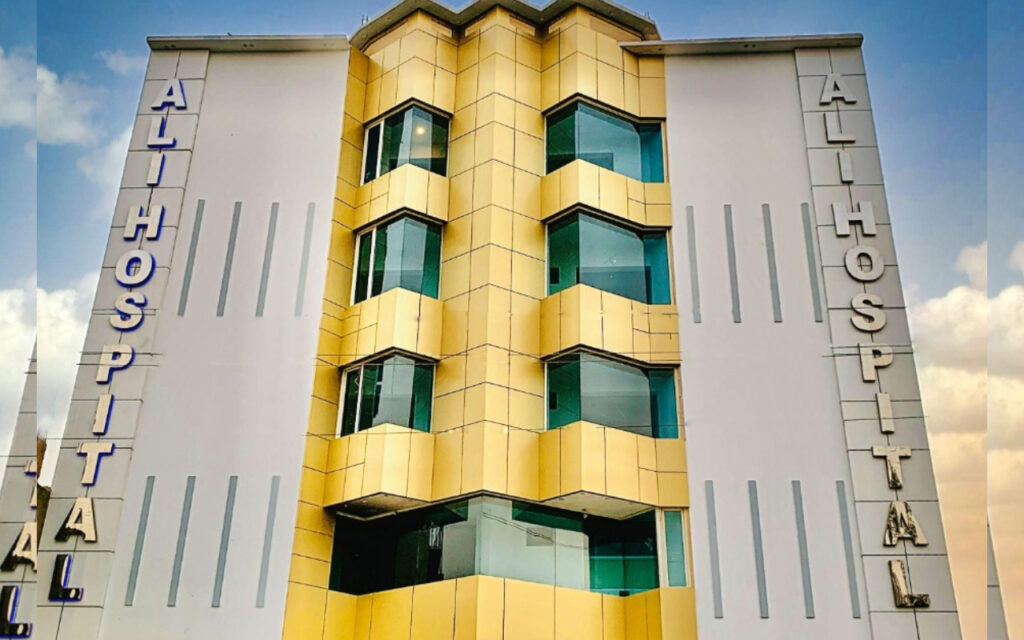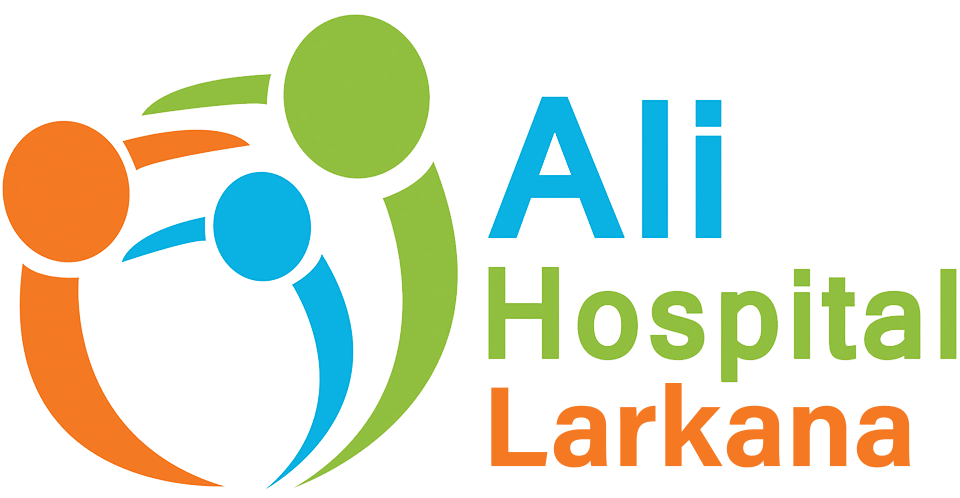
Introduction Ali Hospital Larkana:
Ali Hospital Larkana, a bustling city in the Sindh province of Pakistan. Is home to a significant population in need of round-the-clock medical care. To meet this vital requirement, Ali Hospital Larkana has emerged as a beacon of hope, offering comprehensive healthcare services 24/7. This article explores Ali Hospital Larkana’s commitment to serving the local community. Highlighting its facilities, medical expertise, and dedication to providing prompt and efficient emergency care.
I. Location and Infrastructure Hospital:
Ali Hospital Larkana, strategically located in the heart of Larkana, is easily accessible to residents across the city. The Ali hospital’s modern infrastructure is designed to accommodate a wide range of medical services. Equipped with state-of-the-art facilities, Ali Hospital Larkana boasts spacious waiting areas. Well-equipped consultation rooms, advanced diagnostic laboratories, fully equipped operation theaters, and a dedicated emergency department.
II. Comprehensive Healthcare Services:
Ali Hospital Larkana is committed to delivering comprehensive healthcare services to the Larkana community. Its team of highly skilled and experienced medical professionals encompasses various specialties. Including internal medicine, surgery, pediatrics, gynecology, orthopedics, and more. The Ali hospital Larkana offers a wide range of diagnostic and treatment services. Including laboratory tests, radiology, minor and major surgeries, vaccinations, and maternity care.
III. Emergency Care Department:
The Emergency Care Department at Ali Hospital Larkana is a lifeline for residents in need of immediate medical attention. Operating 24/7, the department is staffed with a dedicated team of emergency physicians, nurses. And support staff who are trained to handle critical situations with utmost efficiency. Equipped with advanced life-saving equipment and technology, the emergency department ensures that patients receive prompt and accurate assessments
IV. Patient-Centric Approach:
At Ali Hospital Larkana, patient care is at the core of their mission. The hospital’s staff members are trained to provide compassionate and personalized care. The hospital emphasizes clear communication with patients and their families. Involving them in the decision-making process and providing comprehensive information about diagnosis, treatment options, and expected outcomes.
V. Community Outreach and Social Responsibility:
Ali Hospital Larkana actively engages in community outreach initiatives and social responsibility programs to promote healthcare. Awareness and provide support to underprivileged sections of society. The Ali hospital conducts health camps, awareness campaigns, and free medical check-up drives in remote areas of Larkana. Ensuring that even those with limited access to healthcare services receive timely and essential medical attention.
Conclusion:
Ali Hospital Larkana stands as a pillar of healthcare in Larkana, Sindh, Pakistan. Catering to the medical needs of the community around the clock. With its advanced infrastructure, skilled medical professionals, and patient-centric approach. The hospital has gained the trust and admiration of the local population. Ali Hospital Larkana’s unwavering commitment to providing high-quality medical care, particularly through its round-the-clock emergency services. Has undoubtedly saved countless lives and continues to make a positive impact on the overall health and well-being of Larkana’s residents.
Radiology Department at Lifeline Hospital:
Advancing Diagnostic Imaging in Larkana
In the ever-evolving field of healthcare, accurate and timely diagnostic imaging plays a crucial role in effective medical treatment. Lifeline Hospital in Larkana, Sindh, Pakistan, understands this importance and has established a state-of-the-art Radiology Department. This article explores the role and significance of the Radiology Department at Lifeline Hospital, shedding light on the advanced imaging technologies, skilled radiologists, and comprehensive services that contribute to enhanced patient care and diagnosis.
I. Advanced Imaging Technologies:
The Radiology Department at Lifeline Hospital is equipped with cutting-edge imaging technologies that facilitate precise and detailed diagnostic evaluations. High-quality equipment, such as digital X-ray machines, computed tomography (CT) scanners, magnetic resonance imaging (MRI) scanners, ultrasound machines, and fluoroscopy devices, allows the department to capture accurate images of various body parts and systems. These advanced technologies aid in the detection, diagnosis, and monitoring of a wide range of medical conditions.
II. Skilled Radiologists and Technologists (200 words) Lifeline Hospital’s Radiology Department boasts a team of skilled radiologists and technologists who are experts in their respective fields. These professionals possess extensive knowledge and experience in interpreting radiological images and employing specialized imaging techniques. Their expertise ensures accurate diagnoses and provides valuable insights for the referring physicians, enabling them to develop effective treatment plans tailored to each patient’s needs.
III. Comprehensive Imaging Services:
The Radiology Department at Lifeline Hospital offers a comprehensive range of imaging services to cater to the diverse needs of patients. These services include:
X-ray:
Digital X-ray imaging is available to capture detailed images of bones, joints, and internal organs, aiding in the diagnosis of fractures, infections, tumors, and other conditions.
CT Scan:
Ali Hospital’s CT scanners produce cross-sectional images of the body, enabling the detection and evaluation of various abnormalities, including tumors, vascular conditions, and injuries.
MRI:
Magnetic resonance imaging provides detailed images of soft tissues, organs, and the musculoskeletal system. It aids in diagnosing conditions such as neurological disorders, joint injuries, and abdominal abnormalities.
Ultrasound:
Utilizing sound waves, ultrasound imaging provides real-time images of internal organs, blood vessels, and developing fetuses. It assists in diagnosing conditions related to the abdomen, pelvis, heart, and vascular system.
Fluoroscopy:
This imaging technique generates real-time moving images of organs, allowing radiologists to assess functions such as swallowing, gastrointestinal motility, and joint movements.
IV. Quality Assurance and Safety:
Ali Hospital’s Radiology Department prioritizes patient safety and quality assurance. The department strictly adheres to radiation safety protocols, ensuring that patients receive the lowest possible radiation doses during procedures. Additionally, regular equipment maintenance, calibration, and quality control measures are implemented to maintain the accuracy and reliability of imaging results.
V. Collaborative Approach and Timely Reporting:
The Radiology Department at Lifeline Hospital follows a collaborative approach, working closely with other healthcare professionals to provide comprehensive patient care. Radiologists communicate effectively with referring physicians to understand clinical histories, discuss imaging findings, and provide timely and accurate reports. This collaboration enhances the overall diagnostic process, leading to improved patient outcomes.
Conclusion
The Radiology Department at Lifeline Hospital in Larkana, Sindh, Pakistan, plays a vital role in advancing diagnostic imaging services. With its state-of-the-art technologies, skilled radiologists, comprehensive range of imaging services, commitment to patient safety, and collaborative approach, the department strives to deliver accurate and timely diagnoses. By leveraging the power of advanced imaging techniques,
